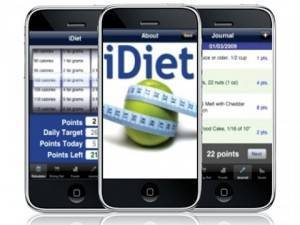From calendar management to turning your phone into a flashlight - it seems there’s an app for everything these days. But what about all those weight loss apps? Are they really effective? It turns out the answer is yes!
A new study published in the Archives of Internal Medicine shows that individuals who utilized a calorie and activity tracking mobile app during the course of their weight loss lost an average of 15 lbs. and kept the weight off for at least a year.
The study by researchers at Northwestern University examined 69 adults, of whom 85% were male, with an average age of 58, who participated in a year-long weight loss program. About half of the participants used the mobile app to enhance their program, while the other half did not.
10 Best Weight Management Tools
All participants were given access to weight loss information sessions, held twice a month for six months, and then once a month for the remainder of the year. Individuals in the mobile app group used a mobile device to record what they ate as well as their exercise activity and duration. This information was then forwarded to a coach who spoke with participants about twice a month. While participants were older and did not have experience with mobile app technology, the app proved easy-to-use.
People who did not utilize the app were asked to record their calorie intake and exercise activity on paper.
Individuals who used the mobile app and attended 80% of the information sessions lost about 15 lbs. and maintained the weight loss for one year. On average, participants in the mobile app group lost about 8.6 lbs. more at every follow-up than those in the control group. This included app users who did not attend the information sessions. Follow-ups were conducted at 3-month intervals at 3, 6, 9, and 12 months.
Weight Loss vs. Weight Maintenance (INFOGRAPHIC)
The app gave immediate feedback, showing users how many daily-allotted calories they had already consumed as well as how close they were to achieving their physical activity target.
Although coach interaction was minimal, the app allowed people to have a sense of accountability because they were aware that someone was tracking their activity, researchers said. If the information was not being updated consistently, the coach would contact the participant.
The effect of the coaches relative to the effect of the app cannot be separated, so further research is necessary. However, there was a maintenance phase with fewer information sessions and no coach feedback aimed at simulating real post-program activity. Participants who used the mobile app maintained their weight loss during this phase.
Bonnie Spring, lead study author and professor of preventive medicine at Northwestern’s Feinberg School of Medicine, says that the study is promising because “this maintenance phase is pretty representative of what we can expect maintenance to look like in the future,” and because the mobile app technology is easily and continuously accessible.
The Bottom Line
The results of this study are not surprising given that the best diet results come from tracking behavior. Using a mobile app just makes it easier and gives us one more reason to make full use of the technology available to us.
The study also shows that regardless of your technological savvy, these apps are aimed at being easy-to-learn and accessible to all, so you shouldn’t be intimidated by them.
With so many weight-loss related mobile apps available, many of which are free, it makes it easy for dieters to choose which app works best for them. Check out our review here: 10 Best Weight Management Tools.

